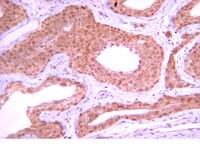Metabolic regulation of CaMKII protein and caspases in Xenopus laevis egg extracts.
McCoy, F; Darbandi, R; Chen, SI; Eckard, L; Dodd, K; Jones, K; Baucum, AJ; Gibbons, JA; Lin, SH; Colbran, RJ; Nutt, LK
The Journal of biological chemistry
288
8838-48
2013
Mostrar resumen
The metabolism of the Xenopus laevis egg provides a cell survival signal. We found previously that increased carbon flux from glucose-6-phosphate (G6P) through the pentose phosphate pathway in egg extracts maintains NADPH levels and calcium/calmodulin regulated protein kinase II (CaMKII) activity to phosphorylate caspase 2 and suppress cell death pathways. Here we show that the addition of G6P to oocyte extracts inhibits the dephosphorylation/inactivation of CaMKII bound to caspase 2 by protein phosphatase 1. Thus, G6P sustains the phosphorylation of caspase 2 by CaMKII at Ser-135, preventing the induction of caspase 2-mediated apoptotic pathways. These findings expand our understanding of oocyte biology and clarify mechanisms underlying the metabolic regulation of CaMKII and apoptosis. Furthermore, these findings suggest novel approaches to disrupt the suppressive effects of the abnormal metabolism on cell death pathways. | 23400775
 |
















